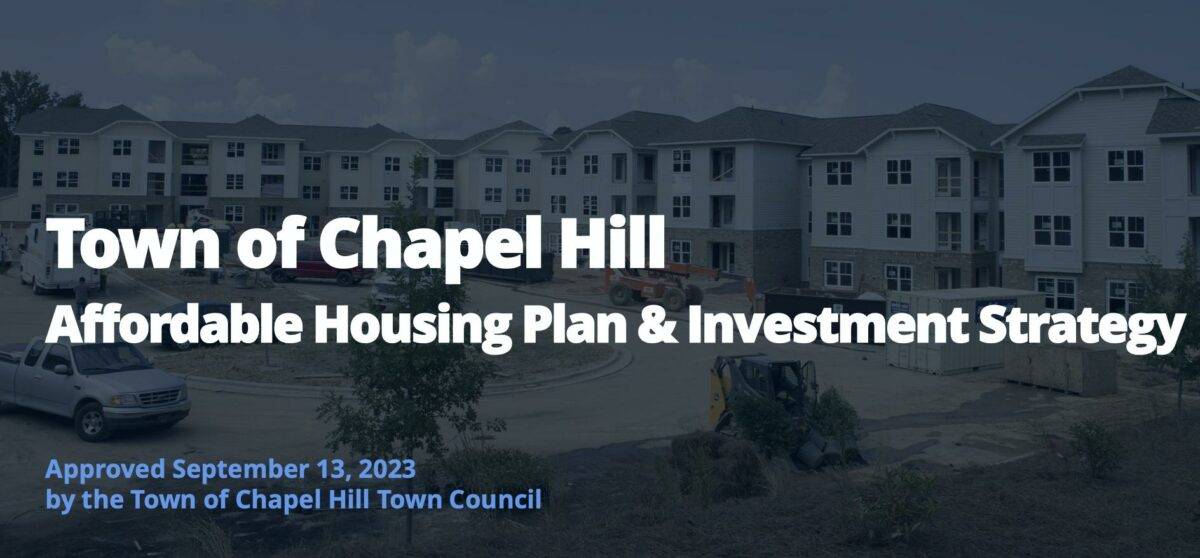- An update from town housing staff on housing activities.
- A continuation of “the initial capital projects conversation started during the Council Retreat.”
What did Council discuss during the retreat?
It’s hard to know, as the retreat is not recorded. We do know from the budget presentation that housing came up at the retreat. The presentation suggests the town is in a strong financial position but doesn’t raise enough revenue to do much beyond 1) hiring and retaining town staff to provide the high level of service Chapel Hill residents demand and 2) maintaining existing services, like police, fire, and transit.
That means that new or growing needs – like affordable housing – will get left behind without new sources of funding.
What are the housing needs?
We all know Chapel Hill needs more affordable housing, including building new units and preserving existing ones. But tonight’s presentation from town staff offers a concrete reminder of how dire the situation is:
- Average monthly rents have increased by more than $300 since 2019, a 24 percent jump.
- The average homebuyer in 2023 needed $200,000 more than in 2019 to purchase a home.
- If you make less than $50,000, you are probably cost-burdened (58%), meaning you spend an unhealthy amount of your income on housing. If you make less than $20,000, you almost definitely do (94%).

According to the presentation, “more resources are needed to support the strong pipeline of affordable housing and make progress toward addressing the affordable housing gap.” From 2025-2028, the town has identified 830 affordable units to invest it (shown below). But it needs $30 million to do so. And that’s above and beyond existing resources, including the town’s affordable housing fund, CDBG funds from the feds, and the affordable housing development reserve.

Simply put, without new sources of funding, the pipeline projects are dead in the water. Crucial sources of subisidy for affordable units, like the Low Income Housing Tax Credit, will flow to other communities that are prepared to move on new affordable projects.
Enter the Affordable Housing Strategy and Investment Plan
Fortunately, the Affordable Housing Strategy and Investment Plan (“the Strategy) approved last year identifies opportunities to add dedicated sources of funding for affordable housing. Dedicated sources are important because they are less vulnerable to the whims of council members over time and signify to afffordable housing developers and funders – nearly all afffordable projects require multiple partners and layers of financial subsidy – that the town is a committed partner with resources on hand to contribute to new affordable units.
The Strategy recommends a housing bond of at least $35 million plus a two cent tax, which would raise rougly $2 million per year (tax increases can pinch low- and fixed-income homeowners, but the town recently provided tax relief to 128 households in partnership with Orange County and the Marian Cheek Jackson Center, and should consider continuing this program on an ongoing basis).
The Orange County Affordable Housing Coalition – made up local nonprofits doing the Lord’s work to keep people housed and with the expertise to build affordable projects, often in partnership with the town – is calling for the town to put a $50 million housing bond on the ballot this fall and to dedicate two cents in tax revenue to affordable housing in the town budget (read their letter of support here and sign a petition in support of their stance here).
Our neighbors and peer communities have recently made similar investments in affordable housing: voters approved a $95 million housing bond in Durham, $80 million in Raleigh, and $40 million in Asheville. Charlottesville leaders approved an affordable housing plan that invests $100 million in affordable housing.
What’s the rush? Didn’t UNC just give the town money for affordable housing?
UNC did recently commit $5 million to the town’s Affordable Housing Loan Fund. The loan funds are designed to be used in tandem with other sources of funding. Without new revenue sources, we will not maximize the potential of the Loan Fund.
From a timing perspective, getting a bond on the ballot in the fall takes some work. The sooner Council moves on a bond, the sooner voters will get their chance to demonstrate their commitment to affordable housing. We want that opportunity this fall.
What’s next?
Tonight’s meeting will give us an initial understanding of Council’s budget priorities, including housing. Because the meeting is a work session, it will not be live streamed, but will be recorded. We’ll do a follow up post soon that breaks down how Council members are thinking about investments in housing.
In the meantime, we encourage you to sign OCACH’s petition and let Council know you want to see a $50 million bond on the ballot in the fall and two cents in property taxes dedicated to affordable housing.

